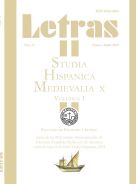Please use this identifier to cite or link to this item:
https://repositorio.uca.edu.ar/handle/123456789/5023| Título: | Dilemas del paraíso : viaje, utopía ymundanidad en la literatura árabe | Autor: | Del Percio, Daniel | Palabras clave: | LITERATURA MEDIEVAL; LITERATURA ARABE; LITERATURA DE VIAJES; UTOPIA | Fecha de publicación: | 2015 | Editorial: | Universidad Católica Argentina. Facultad de Filosofía y Letras | Cita: | Del Percio, Daniel. “Dilemas del paraíso : viaje, utopía y mundanidad en la literatura árabe” [en línea]. Letras, 71 (2015). Disponible en: https://repositorio.uca.edu.ar/handle/123456789/5023 | Resumen: | Resumen: La utopía y el relato de viaje conforman dos narrativas complementarias que describen mundos desconocidos, pero largamente anhelados. No obstante, en el contexto medieval, no podemos interpretar el concepto de utopía en el sentido político propio de la Modernidad, moriano, del término, sino como un proceso de construcción de expectativas que, a partir de un mismo modelo formal que se mantendrá a lo largo del tiempo en todas las manifestaciones de un país o sociedad ideal, tiende a ubicar en una lejanía inaccesible pero narrable la satisfacción de las necesidades de un presente difícil. Este es el caso de la Abundantia, la más antigua forma de utopía, vinculada al reino de Saturno y a sus múltiples versiones medievales: la Cucaña, el país de Jauja, el Dorado. Presente bajo diferentes formas en prácticamente todas las literaturas europeas occidentales, también la literatura árabe medieval hará un uso particular de la utopía y del relato de viaje, en donde incorporará su propia y específica visión religiosa y cultural. Nos proponemos entonces describir el modelo formal propio de la literatura utópica y la modalidad que adquirió el relato utópico de la Abundantia en el Islam, en particular en la leyenda de la Ciudad de Cobre, del geógrafo andalusí Abu Hamid al-Garnati, y su posterior desarrollo en Las mil y una noches. Abstract: Utopia and travel literature are narratives that describe complementary though long-awaited worlds. However, in the medieval context we can not understand the concept of utopia in the politic moorean sense characteristic of Modernity, but instead, it should be understood as a process of constructing expectations. These respond to a pattern to be maintained over time in all manifestations of an ideal country or society, and tend to locate the satisfaction of present needs in an inaccessible but relatable remoteness. This is the case of Abundantia, the oldest form of utopia, linked with the kingdom of Saturn and its multiple medieval versions: the Cucaña, the country of Jauja, the Dorado. This is present in various forms in almost all Western European literatures, whereas medieval Arabic literature also makes a particular use of utopia and travel narrative in order to incorporate its religious and cultural vision. We propose to describe the characteristic pattern of utopian literature, and its application in the Islamic narrative of Abundantia, focusing on the legend of the city of copper, told by the Andalusian geographer Abu Hamid al-Garnati and later developed in The Thousand and One Nights. |
URI: | https://repositorio.uca.edu.ar/handle/123456789/5023 | ISSN: | 0326-3363 | Disciplina: | LITERATURA | Derechos: | Acceso Abierto | Fuente: | Letras Nº 71, 2015 |
| Appears in Collections: | LETRAS - 2015 nro. 71 |
Files in This Item:
| File | Description | Size | Format | |
|---|---|---|---|---|
| dilemas-paraiso-viaje-utopia.pdf | 70,66 kB | Adobe PDF |  View/Open |
Page view(s)
194
checked on Apr 30, 2024
Download(s)
94
checked on Apr 30, 2024
Google ScholarTM
Check
This item is licensed under a Creative Commons License

